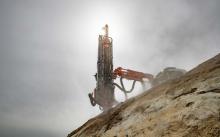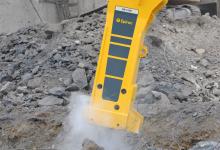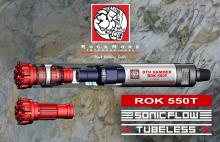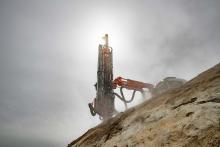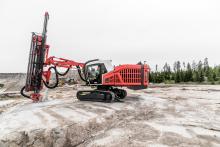Real-time stress monitoring in top hammer drilling can help optimise the drilling process. Liam McLoughlin reports - in our sister title Aggregates Business.
Profitable rock drilling requires a balance between drilling power and cost efficiency.
While the use of high drilling power is required for good performance, excessive power becomes counterproductive due to high stress levels and wear of drilling tools, according to Sandvik Mining and Rock Technology.
The global engineering group says that optimisation of tool stress and consequently tool lifetime is essential for cost-efficient drilling operations. It adds that conventional drilling control technologies have done this based on indirect performance indicators only, such as percussion or feed pressures.
To address this issue Sandvik has launched the RockPulse solution for real-time tool stress monitoring in top hammer drilling. The add-on system integrates directly with the rock drill and its control system and can be used for drilling process optimisation in varying rock conditions. Sandvik says this also helps to reduce the stress fatigue of drilling tools.
RockPulse analyses each piston blow in real time to extract data on the tool stress. This enables operators to optimise drilling power and to minimise inefficient use of percussion energy. Stress waves created by piston strikes are measured continuously using sensor technology developed and patented by Sandvik.
The system consists of a Sandvik shank adapter and rugged contactless sensor inside the rock drill. Stress wave signals captured by the sensor are analysed within the Sandvik SICA drill rig control system. The system is available for new Ranger DXi drill rigs and RD920 series rockdrills.
“Our tests from real-life conditions show a 5% increase in average penetration rate, even though the percussion power was decreased by 4%,” says Jarno Viitaniemi, product manager, surface drilling, Sandvik Mining and Rock Technology. “Drill operators have additionally commented that RockPulse helps them to optimise bit regrinding intervals and thus boost efficiency and productivity.”
The RockPulse real-time drill stress monitoring system from Sandvik in use with a Ranger DX 900i drill rig
Sandvik Mining and Rock Technology is in the process of launching three new i-Series intelligent surface drills.
The Sandvik DR416i rotary blasthole drill was launched in the first half of 2018 and is the largest surface drill in Sandvik’s portfolio, capable of drilling up to 406mm holes while, Sandvik says, offering the highest rotational torques and pulldown forces at the lowest possible operating cost.
The Leopard DI650i, launched at Electra Mining Africa, September 10-14 2018, is said to offer superior mobility, excellent operator comfort and serviceability and an intelligent down-the-hole (DTH ) control system which can be scaled up in the future with more automated features.
Meanwhile, the DR410i, due for release in 2019, is designed for rotary drilling applications with a hole range of 200-225mm and DTH applications with a hole range of 152-225mm. High- and low-pressure versions are available, offering a single-pass maximum hole depth of 14 metres and multi-pass maximum hole depth of 56 metres.
All i-Series products are built around an advanced CANbus design with enhanced control systems. Surface drills equipped with Sandvik’s patented Compressor Management System (CMS) are said to save customers up to 30% on fuel with a proportional increase in engine and compressor life.
The new i-Series intelligent surface drills follow on from the recent launch of Sandvik’s Ranger DXi top hammer drill rig series.
Showcased at steinexpo 2017 in Germany, the Ranger DXi series is claimed by Sandvik to push boundaries with several new high-performing features for improving the drilling process. The company says that improved drilling coverage, a new powerful rockdrill, Sandvik-style intelligence and high fuel efficiency make this drill rig the most powerful and efficient top hammer drill rig in its class. The company adds that it represents “a totally new generation” of the Ranger product family.
Ranger DXi models offer drilling coverage of 55m³, saving work time and minimising the need to reposition the rig. Despite the drill rig’s ability to rotate 290°, its counterweight structure ensures stability by maintaining weight opposite the boom.
Joanne Cooke, president, surface drilling & exploration, Sandvik Mining and Rock Technology, said: “We continue to evolve our product offering to meet the ever-changing technology landscape, but more importantly to make sure we are delivering exceptional value to our customers. The products we have released to the market along with the soon-to-be released products reinforce our culture of aggressive innovation and our never-ending focus on our customers whose feedback we have used in the development of these new products.”
Rockmore International has recently launched its new ROK 550T drill for the European market. The latest addition to the company’s T Series DTH hammer line, the 127mm class product uses the industry-standard QL5/QL50 bit shank, but with the blow tube/foot valve (plastic tube) removed.
Pejman Eghdami, Rockmore International executive vice president, said: “Plastic parts do tend to break in deep hole drilling, causing the hammer to stop, leading to costly downtime. Others have tried removing the plastic tube but they lose a lot of performance in penetration rates. We’ve designed uniquely around that [so that performance can be maintained].”
With high-performance drilling characteristics rated for drilling 140-152mm diameter holes, the ROK 550T is said to be ideal for blast-hole applications involving, among others, geotechnical and geothermal contractors. It is also well suited to water well drilling work.
Rockmore’s first T Series DTH model was the ROK 600T, a 152mm class model that uses a tubeless QL6/QL60 bit shank. The company then expanded the T Series with the ROK 60T-360T hammers that use the IR 360-bit shank without the blow tube/foot valve.
As with all Rockmore DTH hammers, the new ROK 550T is also designed to take advantage of the firm’s patented SonicFlow technology, which optimises airflow by simplifying and streamlining the air paths to minimise backflow and turbulence, delivering more energy to the piston. Field testing of the SonicFlow design was determined to result in faster penetration rates and greater overall DTH hammer efficiency.
The BenchREMOTE operator station from Epiroc is now also available for the company’s SmartROC T45 LF, SmartROC C50 and SmartROC CL drill rigs.
BenchREMOTE enables operators to simultaneously remotely control up to three Epiroc Smart surface drill rigs from a distance of up to 100 metres. The operator station is designed to enable operators to be highly productive without having to enter a dangerous/hazard zone, and to deliver a safer and more effective mining operation.
“BenchREMOTE increases productivity, it enhances safety and it provides the operator with better working conditions,” says Mattias Hjerpe, product manager at Epiroc.
Up to ten rigs can be pre-programmed into each station. The communication between the BenchREMOTE and remote rigs is ensured via a closed and secured wireless network. The solution also supports Geofence for additional safety. The BenchREMOTE can be installed in a customer-supplied vehicle, trailer or in a container.
Finnish-based Rammer – which is owned by Sandvik ¬– has added eight new models this year to its range of Performance Line hammers for breaking applications. The new R01P, RO2P, RO3P, RO4P, RO5P and RO7P models are small-range performance hammers designed to provide a cost-effective solution to any breaking application. Compatible with carriers ranging from 0.8-4tonnes (1,800-8,800lbs ), all models feature a robust and silenced housing to offer increased noise suppression and optimise the hammers for use in urban areas.
The R10P and R12P are medium- range hammers whose features include a nitrogen accumulator, vibration and sound suppression, and a large tool diameter/length.
All the new hammers incorporate a nitrogen piston accumulator and a second pressure dampening membrane-type accumulator, which the company says provides users with an excellent power-to-weight ratio.
Rammer distribution director Rafa López says that acceptance of the eight new performance line hammer models has been “really good” as they are something that has been requested by its dealers.
“When introducing something new in the market, it always takes a while before big things happen. However, this particular case has been different due to demand already existing from the past,” López adds. “As Rammer has always been seen as a premium product, obviously markets dominated by those kind of products are best-sellers for us. We expect now with the launch of Performance Line to be able to grow the rest of the markets globally.”
